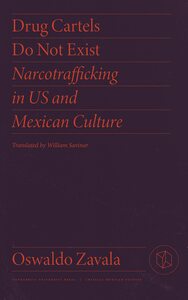You need to sign in or sign up before continuing.
Take a photo of a barcode or cover
24 reviews for:
Drug Cartels Do Not Exist: Narcotrafficking in US and Mexican Culture
Oswaldo Zavala
24 reviews for:
Drug Cartels Do Not Exist: Narcotrafficking in US and Mexican Culture
Oswaldo Zavala
challenging
informative
reflective
challenging
informative
medium-paced
slow-paced
reading this without any awareness of the works it was referencing was maybe not the move but still very informative
adventurous
challenging
dark
informative
reflective
sad
slow-paced
dark
informative
mysterious
reflective
medium-paced
an important book on how literary productions shape the limits of our conception of the political.
adventurous
informative
medium-paced
challenging
informative
medium-paced
A very compelling work of translated nonfiction the challenges dominant narratives around drug trafficking and "cartels".
As someone who grew up during the rise of true crime and the heyday of Vice Media's coverage of drugs, outside of liberal critiques of the War on Drugs as "ineffectual" at dealing with drug addiction in "the West" I have not been exposed to many critiques outside of the American context.
This book features a deconstruction of the concept of "a cartel" as a powerful transnational group that eclipses the power of the state and must be combated at all costs and argues that it is actually a "national security" construction used to help the state smoke screen its actions and prevent a more political reading of events.
As this book was primarily an analysis of how this concept is used in media, I come out of it cautiously interested in the conciet though I am planning to engage in the books it is in conversation with to expand my understanding of the issue.
As someone who grew up during the rise of true crime and the heyday of Vice Media's coverage of drugs, outside of liberal critiques of the War on Drugs as "ineffectual" at dealing with drug addiction in "the West" I have not been exposed to many critiques outside of the American context.
This book features a deconstruction of the concept of "a cartel" as a powerful transnational group that eclipses the power of the state and must be combated at all costs and argues that it is actually a "national security" construction used to help the state smoke screen its actions and prevent a more political reading of events.
As this book was primarily an analysis of how this concept is used in media, I come out of it cautiously interested in the conciet though I am planning to engage in the books it is in conversation with to expand my understanding of the issue.
reflective
tense
medium-paced
slow-paced
not really the book i was looking for. the central thesis is that the "narco" is a discursive invention of the state created to justify the pursuit of certain geopolitical interests. but i felt that the book only sketched the contours of the geopolitical interests at issue--e.g., brief mention that mexico's budding energy industry called for significant depopulation of certain areas justified under the drug war--and didn't even really focus on how the state creates its enemies. lots of analyses of novels and journalistic articles that all sort of boil down to whether the object conforms to or subverts state-created discourse. i think drug war capitalism might be a better fit for someone looking for a sociological / historical approach.






